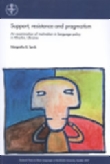Tyck till om SwePub Sök här!
onr:"swepub:oai:DiVA.org:su-6792"
Sökning: onr:"swepub:oai:DiVA.org:su-6792" > Support, resistance...
- 1 av 1
- Föregående post
- Nästa post
- Till träfflistan
Support, resistance and pragmatism : An examination of motivation in language policy in Kharkiv, Ukraine
-
- Søvik, Margrethe (författare)
- Södertörns högskola,Stockholms universitet,Slaviska institutionen,Baltic & East European Graduate School (BEEGS)
- Sandomirskaja, Irina (preses)
-
- Bodin, Per-Arne, Professor (preses)
- Stockholms universitet,Slaviska institutionen
- visa fler...
- visa färre...
- (creator_code:org_t)
- ISBN 9789185445660
- Stockholm : Acta Universitatis Stockholmiensis, 2007
- Engelska 354 s.
- Serie: Stockholm Slavic Studies, 0585-3575 ; 34
- Serie: Södertörn doctoral dissertations, 1652-7399 ; 15
- Doktorsavhandling (övrigt vetenskapligt/konstnärligt)
Abstract
Ämnesord
Stäng
- The Ukrainian society has gone through vast changes since independence in 1991 and in this thesis some of these social changes are discussed through the prism of language policy. The main topic of the study is language policy (conceptualised as language practices, language beliefs, and language management) in the eastern Ukrainian city Kharkiv. This topic is examined within a framework focusing on motivation, allowing for a study of how people in Kharkiv describe, explain and rationalise language policy in the context of change in society. Ukrainian is the only state language in Ukraine, but Russian is widely used in Ukrainian society, and in Kharkiv Russian is the predominantly used language. One specific topic of the study is how young Ukrainians perceive the role granted the Ukrainian language in on-going processes of nation-building, related to the formation of a national identity. This is contrasted with discussions on individual linguistic rights and what is considered reasonable to demand from the Ukrainian population in terms of language practices. Further, the study examines the concept of language conflict, notably what kinds of conflict can be identified in and extracted from discussions on the role of language in society. This examination shows that it is not necessarily a case of potential conflict between groups or individuals, but also that individuals may struggle with internal conflict. This study demonstrates how language conflict is not about language, but rather about social positions, interests and value systems. This also illustrates the fact that the three components of language policy are not necessarily interrelated and consistent. Especially language practices and language beliefs are often at odds. Fieldwork was carried out in Kharkiv 2003-2005 and the study relies on a combination of methods (in-depth individual interviews, group interviews and a large-scale questionnaire).
Ämnesord
- HUMANIORA -- Språk och litteratur -- Studier av enskilda språk (hsv//swe)
- HUMANITIES -- Languages and Literature -- Specific Languages (hsv//eng)
Nyckelord
- language policy
- language beliefs
- language practices
- language management
- language conflict
- motivation
- language attitudes
- combining methods
- nation-building
- linguistic rights
- Ukraine
- Slavic languages
- Slaviska språk
- slaviska språk
- Slavic Languages
Publikations- och innehållstyp
- vet (ämneskategori)
- dok (ämneskategori)
Hitta via bibliotek
- Support, resistance and pragmatism An examination of motivation in language poli... (Sök publikationen i LIBRIS)
Till lärosätets databas
- 1 av 1
- Föregående post
- Nästa post
- Till träfflistan
Hitta mer i SwePub
- Av författaren/redakt...
- Søvik, Margrethe
- Sandomirskaja, I ...
- Bodin, Per-Arne, ...
- Ryazanova Clarke ...
- Om ämnet
-
- HUMANIORA
- HUMANIORA
- och Språk och litter ...
- och Studier av enski ...
- Delar i serien
- Stockholm Slavic ...
- Södertörn doctor ...
- Av lärosätet
- Stockholms universitet
- Södertörns högskola
Sök utanför SwePub
- Sök vidare i:
- Google Book Search
- Google Scholar
Kungliga biblioteket hanterar dina personuppgifter i enlighet med EU:s dataskyddsförordning (2018), GDPR. Läs mer om hur det funkar här.
Så här hanterar KB dina uppgifter vid användning av denna tjänst.
- Copyright © LIBRIS - Nationella bibliotekssystem
- LIBRIS.kb.se

